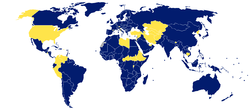International Seabed Authority
The International Seabed Authority (ISA) (French: Autorité internationale des fonds marins) is a Kingston, Jamaica-based intergovernmental body of 167 member states and the European Union.
[23][24] The convention also established a body called the Enterprise which is to serve as the Authority's own mining operator, potentially generating "hundreds of millions of dollars in royalties" to be shared with developing nations.
Rather, this task is left to another body established by UNCLOS, the Commission on the Limits of the Continental Shelf, which examines scientific data submitted by coastal states that claim a broader reach.
[38] In 2001-2002 the ISA signed contracts with Yuzhmorgeologya (Russian Federation); Interoceanmetal Joint Organization (IOM) (Bulgaria, Cuba, Slovakia, Czech Republic, Poland and Russian Federation); the Government of the Republic of Korea; China Ocean Minerals Research and Development Association (COMRA) (China); Deep Ocean Resources Development Company (DORD) (Japan); Institut français de recherche pour l’exploitation de la mer (IFREMER) (France); the Government of India.
[44] The Authority holds five contracts for the exploration of cobalt-rich ferromanganese crusts in the Western Pacific Ocean with China Ocean Mineral Resources Research and Development Association (29 April 2014); Japan Oil Gas and Metals National Corporation (JOGMEC, 27 January 2014); Ministry of Natural Resources and Environment of the Russian Federation (10 March 2015), Companhia De Pesquisa de Recursos Minerais (9 November 2015) and the Government of the Republic of Korea (27 March 2018).
[45][46] Environmentalists, scientists from 44 countries, Google, BMW and Volvo, World Wildlife Fund and several Pacific nations, including Fiji and Papua New Guinea, have called for a moratorium on deep-sea mining until more scientific research is conducted on its impact on the marine environment.
[49] The environmental organization Greenpeace has raised objections about deep seabed mining disrupting the habitats of newly reported species, from crabs to whales to snails that survive without eating and congregate near bioluminescent thermal vents.
[50] Greenpeace has urged the ISA to further develop UNCLOS' foundational Article 136 principle "of common heritage to all mankind" to revise regulations and set conservation targets.
In a 2018 Greenpeace Research Laboratories report the organization stressed the importance of protecting marine biodiversity from toxins released during seabed mining for natural gas and rare metals for photovoltaic cells.
The Guardian also reported that Germany and environmentalists had raised questions about the lack of transparency by the ISA's Legal and Technical Commission (LTC), which conducts closed meetings to set standards and issue guidelines for seabed mining.
[11] ISA head Michael Lodge had criticized these groups, saying there was "a growing environmental absolutism and dogmatism bordering on fanaticism" and arguing that seabed mining was "predictable and manageable".
"[11] The exact nature of the ISA's mission and authority has been questioned by opponents of the Law of the Sea Treaty who are generally skeptical of multilateral engagement by the United States.
[61] As an observer, not an UNCLOS signatory, the U.S. will not be allowed to vote on approval of final commercial mining regulations and will be unable to sponsor companies to apply for contracts in international waters.
[62] By July 10, 2023, 17 countries had called for a deep-sea mining moratorium or pause, including Germany, New Zealand, Spain, France, Sweden, Fiji, and the Federated States of Micronesia.
[63] On July 29, 2024, President Surangel S. Whipps Jr. of Palau delivered an address titled "Upholding the Common Heritage of Humankind" to the 29th General Assembly of the International Seabed Authority (ISA) in Kingston, Jamaica.
He highlighted Palau’s deep cultural and economic ties to the ocean and reiterated the call for an immediate moratorium on deep-sea mining, citing the associated environmental risks and uncertainties.
He underscored the critical role deep ocean ecosystems play in global environmental health and advocated for prioritizing long-term sustainability over short-term economic gains.
"[64][65][66] The number of countries against the imminent start of mining for metallic nodules on the seafloor increased to 32 during the 29th ISA annual assembly, with Austria, Guatemala, Honduras, Malta, and Tuvalu joining the list.
In 2013, the ISA approved amendments to its mining code on deep sea exploration, stating a prospector should take a precautionary approach to avoid polluting the ocean and should immediately inform the Secretary-General of any prospect-related incidents that threaten the marine environment.
[72][70] The Council of the Authority began work in August 2002 on another set of regulations, covering polymetallic sulfides and cobalt-rich ferromanganese crusts, which are rich sources of such minerals as copper, iron, zinc, silver and gold, as well as cobalt.
[74] In addition to its legislative work, the Authority organizes annual workshops on various aspects of seabed exploration, with emphasis on measures to protect the marine environment from any harmful consequences.
[75] Studies over several years covering the key mineral area of the Central Pacific resulted in a technical study on biodiversity, species ranges and gene flow in the abyssal Pacific nodule province, with emphasis on predicting and managing the impacts of deep seabed mining[76] A workshop at Manoa, Hawaii, in October 2007[77] produced a rationale and recommendations for the establishment of "preservation reference areas" in the Clarion–Clipperton zone, where nodule mining would be prohibited in order to leave the natural environment intact.
[78][79] In recent years, however, interest in deep sea mining, especially with regard to ferromanganese crusts and polymetallic sulphides, has picked up among several firms now operating in waters within the national zones of Papua New Guinea, Fiji and Tonga.
A campaign was launched in February 2008 to identify participants, establish a network of cooperating bodies and seek outside funds to augment the initial $3 million endowment from the Authority.



